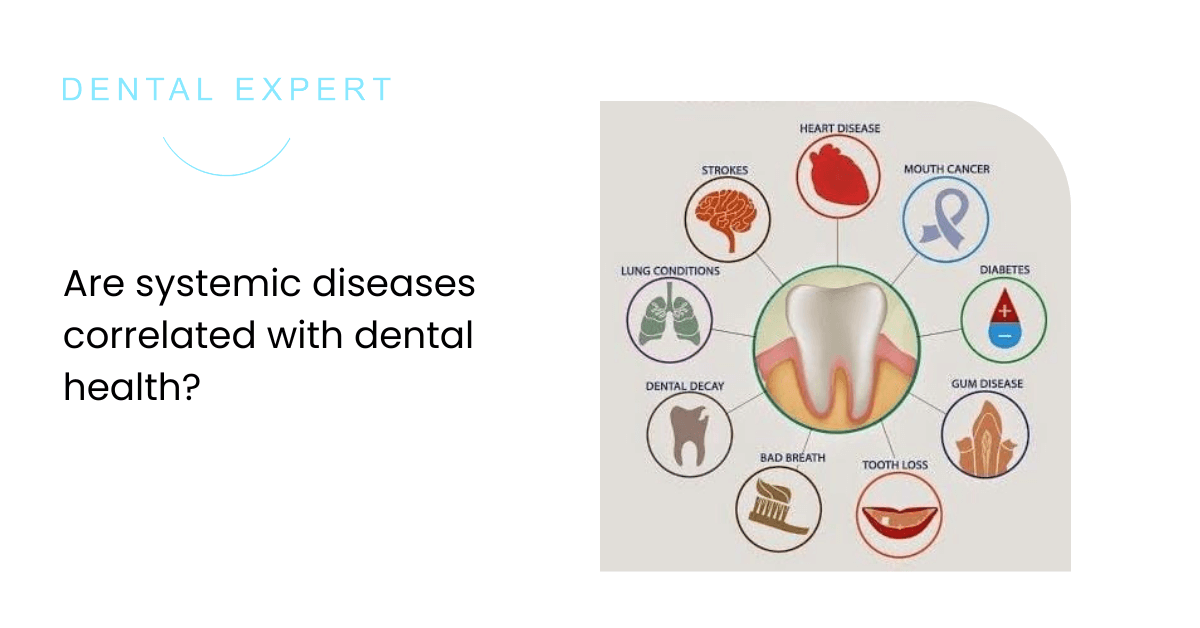Preventing cavities and bad breath is only few of the reasons of maintaining good oral health. Many are unaware of the fact that our overall health, particularly the condition of other organs, is directly correlated with our oral health.
In this blog we’ll discuss about oral hygiene and how lack of it can give rise to systemic diseases and how maintaining good dental hygiene can reduce your risk of acquiring systemic diseases like diabetes, hypertension, and heart disease. You’ll also learn how maintaining poor oral hygiene can result in chronic problems like periodontitis.
What is a systemic disease?
A sickness that affects organs in the body is referred to be a systemic disease. Many oral conditions, including periodontitis and dental caries, for instance, might raise the chance of acquiring systemic conditions like diabetes and heart diseases like myocarditis. Most systemic disorders are commonly referred to as chronic diseases because they run for a long time. Also, these are chronic health issues that may slowly impair your body’s functionality.
Mouth, nose, and throat are all a part of our body and they are habitat of various microorganisms. Our tongue and gums are just two of the many body surfaces that are home to these bacteria. They number in the billions and each one serves a specific function in body’s natural defensive mechanism against pathogenic microorganisms.
Signs of a systemic illness
A systemic sickness is one that affects different body systems, or even the entire body. The hands are intricate. Blood arteries, nerves, skin and tissues associated to the skin, bones, muscles, tendons, and ligaments are just a few of the different types of tissue that make them up.
Also Read : The Health Benefits of Orthodontic Treatment
Gastrointestinal (GI) signs of systemic illnesses might include stomach discomfort, nausea, vomiting, diarrhoea, constipation, jaundice, and abnormal liver function tests. These digestive symptoms may indicate a number of immune, viral, and endocrine problems.
Some examples of signs of systemic sickness are red streaks, psoriasis, pincer nail and pyrogenic granuloma.
Effects of Poor Oral Hygiene on Various Organs
On Bones
- Change in the bone’s size and shape.
- Modification of trabecular size, number, and direction.
- Modified cortical structure densities and thicknesses.
- A change in the overall bone density.
On Facial Structures
It may be challenging to identify actual changes in bone density since numerous factors involved in the creation of a diagnostic image can affect the density of the image. Mature teeth are unaffected by systemic diseases that cause a decrease in bone density; the teeth may contrast with a radiolucent jaw because of their normal density.
In extreme circumstances, it could look like there is no bone support for the teeth. Moreover, cortical structures can vanish, seem thin, and lack definition. As the radiopacity of the cancellous bone approaches that of the cortical bone, a real increase in bone density may be recognised by a reduction of contrast in the inferior cortex of the mandible. In contrast to the nearby radiopaque thick bone, the inferior alveolar nerve canal’s radiolucent outline frequently seems more prominent.
On Cardiovascular Vascular System
A collection of illnesses known as cardiovascular diseases, or CVD, affect the heart and blood arteries. More than a third of the world’s population is afflicted by CVD, however the majority of people are unaware that they have the condition. Smoking, a poor diet, a lack of physical activity, and greater levels of stress are risk factors for having CVD.
Also Read: Teeth Cleaning- Procedure, Cost and Side Effects
Bad dental health may be a sign of other hazardous lifestyle choices like smoking, eating poorly, or not exercising enough. The emergence of CVD may be influenced by several elements.
On Respiratory System
There are numerous oral conditions that are intimately related to long-term respiratory conditions as asthma and allergies. People with asthma, allergies, or both have high amounts of certain oral bacteria in their airways. This indicates that these microorganisms have the potential to irritate and inflame the airways, resulting in increased allergies, asthma attacks, and other disorders of the mouth including periodontitis.
A major contributing factor in the spread of these diseases is poor oral hygiene. The lungs can be impacted by a variety of oral illnesses. The transfer of microorganisms from the mouth to the lungs is one of them. Sputum production is increased as a result of irritation and inflammation, and coughing can spread bacteria from the mouth to the lungs.
Association Between Oral Hygiene, Diabetes and systemic disease
Diabetes patients frequently have more dental issues than non-diabetics. Diabetes risk might be increased by having poor oral health. This is because some oral conditions, such gum disease, change how the body reacts to glucose.
As a result, blood sugar levels rise, which may eventually raise the chance of getting diabetes. The progression of oral diseases can be stopped or slowed down with proper dental care. This entails maintaining your teeth and gums by going to the dentist frequently. utilising fluoride toothpaste and brushing your teeth at least twice a day.
Conclusion
Your total health may be seen through your dental health, which goes beyond merely having a lovely smile. For this reason, your dentist will constantly advise that you practise good oral hygiene, including brushing your teeth twice a day and going to the dentist for routine cleanings and examinations. Based on the findings of your oral examination and their professional judgement, your dentist will make recommendations about how you might improve your dental hygiene.
For dental disorders like caries and periodontitis to be prevented or slowed down, good oral hygiene must be practised daily. Also, by doing this, you’ll have fewer bacteria in your mouth and less chance of spreading them to other regions of your body.

